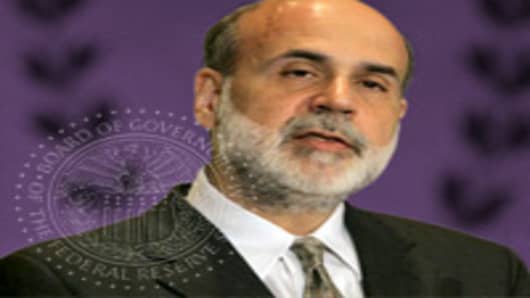World stocks hit their lowest in almost two months, major government bonds tumbled and the dollar jumped on Tuesday after the Federal Reserve chief fired another warning shot on inflation, fanning expectations of higher interest rates.
Fed chairman Ben Bernanke said on Monday that the U.S. central bank will strongly resist rising long-term inflation expectations.
His remarks came less than a week after he gave a rare warning on the inflationary impact of a weak dollar.
Major central banks have stepped up their anti-inflation stance as oil prices have surged to record levels.
European Central Bank President Jean-Claude Trichet signalled last week that euro zone interest rates could rise in July.
Inflation is rising and expectations of higher interest rates are strengthening even though the global economy faces a U.S.-led slowdown and concerns persist about credit-related losses at investment banks.
This bodes ill for stocks and risky assets, while government bonds are unable to attract safe-haven bid as investors who fear inflation dump these instruments too.
US stocks opened lower, partly on Bernanke's comments, while the dollar rose. A stronger dollar didn't stop oil prices from rising further, however.
"Rates (are possibly) going to have to go up when the economic outlook is weak,'' said Lawrence Peterman, investment director at Eden Financial. "Most investors are bearish on the basis that the economic news can only get worse and that means profit news will only get worse. The bank (stocks) again are dreadful -- the outlook for the economy looks terrible.(There is) no sign of any bottom in these stocks.''
(Atlantic Equities' Edward Lewis discusses Bernanke's comments -- see video at left.)
After Bernanke's comments, government bonds across major economies tumbled. Short-dated U.S. Treasury yields posted their biggest one-day jump in 25 years on Monday. Two-year U.S. yields rose to 2.75 percent, their highest level since early January.
Interest rate futures now fully price in a chance of a quarter-percentage point rise in U.S. interest rates by September to 2.25 percent.
"Behind these abrupt shifts lies in our view a re-assessment of the risk that central banks on both sides of the Atlantic may keep rate policy more restrictive than justified by slowing growth in order to prevent inflation expectations becoming unmoored,'' Goldman Sachs said in a note to clients.
"Key policy makers have stepped out to argue that they would not tolerate an erosion of their credibility as inflation-fighters, tacitly implying that a sacrifice in terms of lower activity may be required to achieve their objectives.''
The dollar rose 0.9 percent against a basket of six major currencies. It rose as high as 107.13 yen.
A firmer dollar failed to tame energy prices. U.S. light crude rose 0.2 percent to $134.61 a barrel although it was off last week's record peak.




